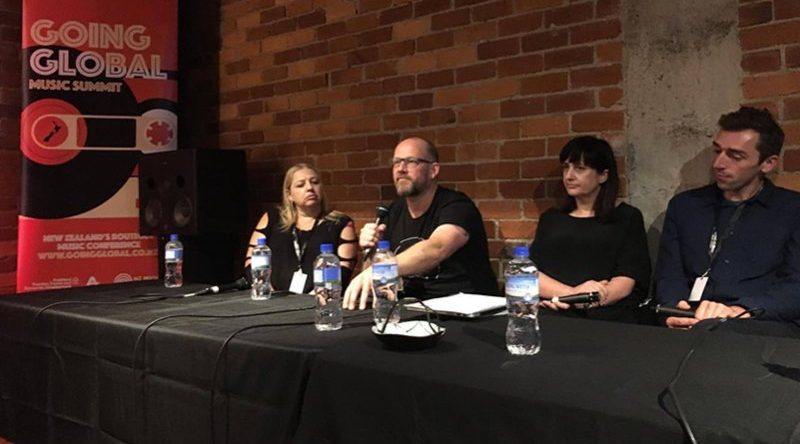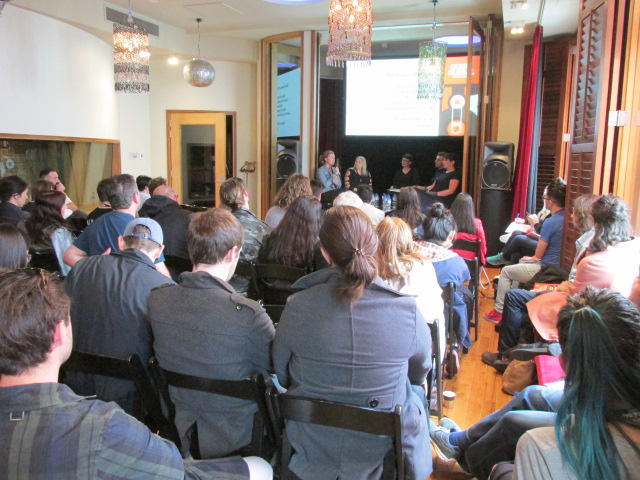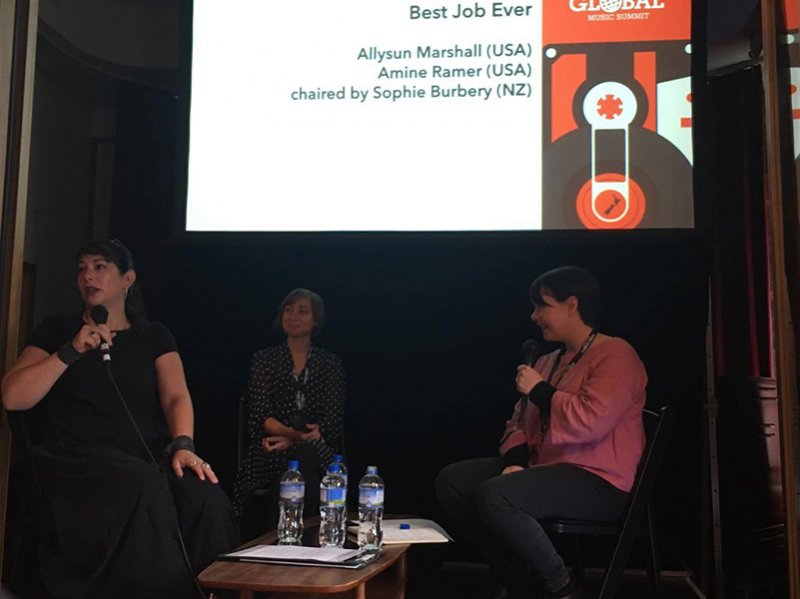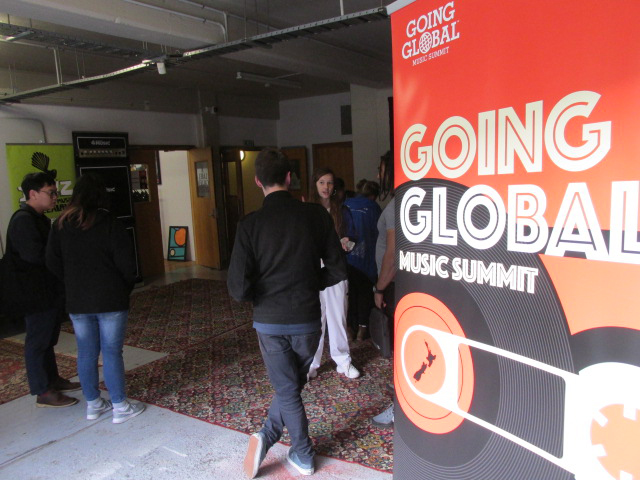Going Global Music Summit 2017, Auckland September 1 & 2
Going Global Music Summit 2017, Auckland September 1 & 2
The Going Global Music Summit 2017 took place within Neil Finn’s Roundhead Studios. The legendary venue and 30+ international music industry professionals from across the world combining to the annual event’s first ever complete sell out across Friday and Saturday sessions. Anzel Singh provided NZM with his outtakes from a busy couple of days.
The two days of the seventh Going Global Music Summit comprised mostly of seminars, ranging from how to get scouted by A&R and getting on Spotify playlists to understanding how PR and journalism work hand in hand, as well as how music gets from publishing companies to film music supervisors. A short-course version of Alison Wenham’s UK training programme on women’s public speaking was also provided as a workshop for developing confidence.
Day One
Friday’s sessions kicked off with Andrew Dubber (Kiwi director of Music Tech Fest) presenting The Market Today and explaining blockchain, giving his insight on the pros of how song ownership could be established using this database, as well as the cons – such as forgetting your password essentially meaning losing ownership of your music! Unfortunately a mostly confusing talk, but thought provoking nevertheless regarding a possible future of music sale payments.
The keynote presentation saw Alison Wenham interviewed by Lars Brandle, Billboard’s Australasian correspondent. Alison fiercely stood up for independents making strong points about major labels wanting your market share and not you, while independent industry managers risk a lot more for their artists’ careers.
Unlocking Australia emphasised planning being key to success when it comes to breaking in our sibling country. Melbourne is the “heart and soul of Aussie music,” while Sydney is the business capital, so splitting your time between the two was recommended. Brisbane’s Big Sound, which followed Going Global by just a few days was recommended for networking opportunities if you’re un-managed and wanting to check out the scene.
A session titled Brave New World involved A&Rists Jane Abernathy and Stuart Meyer, Bandcamp curator Andrew Jervis and label founders Ben Swanson and Bill Roe discussing release and scouting. According to Abernathy, director of A&R for 4AD (Aldous Harding), analytics and stats were less important and having no stats could potentially be a good thing as many in A&R love to feel as though they have discovered you and can be responsible for your launch.
Short attention spans were mentioned in the sense of bloggers calling your album ‘old’ shortly after its release, so making the most of your promotion right after its out into the world is vital. Rather than sending cold demos to record labels, they recommended instead sending material to promoters, management and other professionals who themselves connect to A&R as a better way of getting noticed.
The long first day of 11 different sessions closed with Let’s Be Remarkable, a panel involving advice for songwriters, band members and musicians in general. How it’s important to be obsessive about your craft to succeed, how you shouldn’t be afraid to suck in order to be honestly artistic, and how sometimes having a separate space to write material can really make a difference. Shihad’s Jon Toogood talked about the wisdom of splitting song royalties fairly within a band even if you did most of the songwriting, considering your bandmates are all taking time out of their lives to make the band a success, and keeping the group together is the most important thing.
Day Two
Back for the 10am start of Saturday at the Going Global Music Summit, the Best Job Ever panel comprised two USA vistors, Sugaroo! Music’s Allysun Marshall and music supervisor for States of Sound Amine Ramer, with local artist Sophie Burbery (Little Bark) taking lead. As a major fan of writing songs for soundtrack it was exciting to hear from these experts how songs actually get chosen for film and TV, and what can make the difference between getting a cut and being thrown into the discards.
Turns out even if you have the most amazing song, that may fit a scene perfectly, if the song has several writers, each signed to a different publishing company, or if one writer can’t easily be contacted (ie. all the information regarding copyright is too much work to track down) this can easily cost you your on-screen debut and earnings. Music supervisors most likely won’t take on board a song that requires excess sleuthing, so keeping track of your publishing and having sole rights to your song could prove advantageous.
The main take home message was that your best bet to getting a song onto the big screen is getting a (pro-active and connected) publishing deal, so giving your music a much better chance of being heard by an international music supervisor. As an independent, cold calling will often get you nowhere, but if you do go down this road then clearly label your music! Supervisors we were told, hyper-categorise their music into folders to make it quick and easy find exactly what they’re looking for – so Track 4 from Unknown Artist will not get any action – no matter how good.
The Power of Playlists came next. Assuming everyone reading this wants to know how to approach getting on said Spotify playlists and tips I’ll get straight to the point.
Spotify is a democratic system in that anyone can reach them directly, major labels to independent musicians. What they will be expecting from you will be a working streaming/downloading link, imagery for a playlist cover and a really short relevant brief on you as an artist. Another note, Spotify doesn’t recognise ‘playlist pluggers’ and wouldn’t recommend you pay anyone to help you get onto a playlist.
The fundamental goal of the editorial team at Spotify is to look for and find new music and try to elevate the fanbase of that artist. If you are doing it yourself, their deadlines are a week in advance for New Music Friday promotions.
In New Digital Trend Andrew Jervis (U.S. chief curator of Bandcamp) talked about a planned artist and label-only app for the platform. This is designed to make managing stock and marking items as shipped more efficient. New features such as direct messaging to fans and offering them rewards for their loyalty such as free tickets or discounts to a show for always buying merchandise or preordering every album may also soon be provided.
With over 50 speakers, three different rooms and 10 sessions each day, inevitably some interesting presentations frustratingly clashed with others. Coming to Going Global with intentions on what you want to get out of the event can really take the guess work out of choosing which panels you attend and who you’re aiming to talk to in the meet and greet opportunities.
After the final panel, the chairs were moved to the edges of the room, where the industry guest speakers are seated with an empty seat in front of them and an identifying sign so you know who you’re talking to. This is the speed networking session in which you get five minutes to talk to whoever you want (granted if someone doesn’t beat you to it and a line doesn’t form), rotating partners every five minutes for an hour.
This closed the 2017 Going Global Music Summit, an amazing opportunity to be in a space with like-minded people, sharing their love for music.





